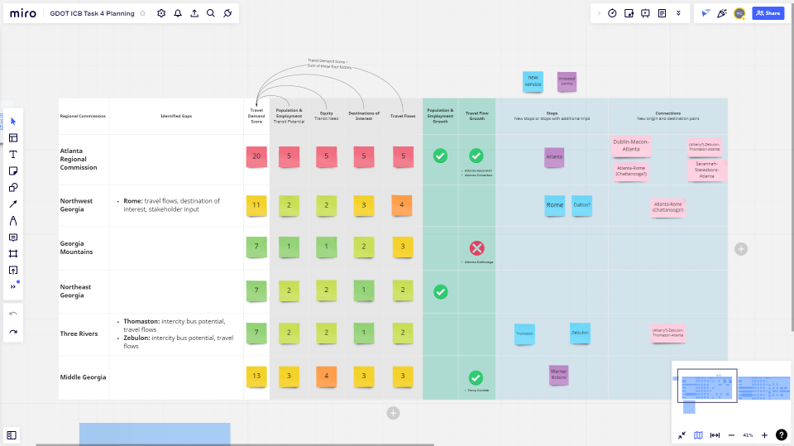Building on the statewide transit plan, this study identified unmet intercity transportation needs and designed intercity bus route alternatives for potential intercity bus expansion of the Georgia Department of Transportation (GDOT)’s transit program. Intercity bus service provides a vital link between rural communities and the rest of Georgia, creating a statewide public transportation network. This study examined existing intercity and transit services across Georgia, the demand for intercity travel, service gaps, potential route alternatives, and the impact of those route alternatives, and serves as a guide for GDOT on how best to spend the funds from the Section 5311(f) Intercity Bus Program.
We combined robust market analysis and stakeholder engagement to identify intercity bus needs in Georgia. To summarize travel demand across the state, we developed an intercity travel demand score for each of the 12 regional commissions based on intercity travel potential, travel needs, points of interest, and statewide travel flows. Surveys and stakeholder interviews were also key in understanding opportunities, challenges, and gaps in the existing service.
Through a series of consultant and client workshops, the project team developed recommended routes based on the identified gaps. Overall, the identified route alternatives can provide additional intercity bus connections to cities and communities across Georgia to increase residential and employment accessibility and enhance economic opportunities.


Solutions and Outcomes
- Developed a methodology and calculated an intercity travel demand score for Georgia’s 12 regional commissions.
- Identified gaps in intercity bus service and designed route alternatives to meet those gaps.
- Surveyed intercity bus providers, local and regional providers, and regional commissions to gather input on intercity bus service needs in Georgia.
- Interviewed intercity bus providers to better understand intercity bus service opportunities and challenges.